After congressional Republicans widely rejected a bipartisan commission to investigate the Capitol riot, US Rep Michelle Fischbach claimed that “Democrats refuse to put together a truly bipartisan commission” – after she voted against the bipartisan attempt from both Democrats and Republicans.
“Give me a break,” Democratic US Rep Jim McGovern told the House of Representatives on 30 June.
House Democrats are moving forward with a select committee after Senate Republicans blocked a bipartisan probe into the events surrounding the 6 January riot and its aftermath, after a mob fuelled by Donald Trump’s baseless narrative that the 2020 presidential election was “stolen” from him stormed the halls of Congress to overturn the votes of millions of Americans.
“I noticed there’s a lack of Republicans who have the backbone to come down here and explain … why they won’t support the bipartisan commission or the select committee,” Mr McGovern said. “They don’t want to be on the record defending a position aimed at not getting the truth.”
Only two Republicans – Liz Cheney and Adam Kinzinger, both prominent GOP critics of the former president – voted to support the select committee on Wednesday.
The House voted 222 to 190 to create the committee, with Ms Cheney and Mr Kinzinger joining all present Democrats to support it, and all other GOP lawmakers rejecting it.
Though she said in a statement that a bipartisan investigation would be “the best way” to probe the assault, Ms Cheney condemend the former president by name for his persistent attempts to undermine the electoral process.
“On an almost daily basis, Donald Trump repeats the same statements that provoked violence before,” she said. “His attacks on our Constitution are accelerating. Our responsibility is to confront these threats, not appease and deflect.”
A select committee remains the “only remaining option” for a congressional investigation, she said.
The bipartisan measure passed the House last month, but with only 35 Republicans voting with Democrats to support it.
Ms Fischbach did not; she blamed Senate Republicans for blocking its passage.
“Now we’re blaming the Senate?” Mr McGovern said. “175 of my Republican colleagues voted against [the bipartisan commission]. They were complicit.”
The bipartisan effort led by Republican Rep John Katko with Democratic Rep Bennie Thompson proposed a 10-person commission, with each party getting an equal number of members and subpoena power, similarly modelled after the congressional commission that followed the 11 September terror attacks.
After that proposal was blocked in the Senate, House Democrats introduced a resolution creating a13-member committee to include five Republicans, and it will issue a final report with “findings, conclusions, and recommendations” to the House.
Ms Fischbach claimed that House Speaker Nancy Pelosi’s committee is “far more skewed” than Republicans’ partisan Benghazi hearings – despite the language in the resolution being the exact same.
House Majority Leader Steny Hoyer said Republican objections sound as if they were “written by Lewis Carroll”.
Democratic Caucus Chair Hakeem Jeffries condemned GOP lawmakers for apparent hypocrisy, alleging that “the radical right consistently claims to be the party of law and order, but they refuse to sign off on an investigation” into an attack that “embodies lawlessness”.
House Republicans “have chosen party over patriotism, they have chosen autocracy over democracy, they have chosen the ‘big lie’ over the rule of law” and “conspiracy theories over the Constitution”, Mr Jeffries said.
In a letter to colleagues on Wednesday, Speaker Pelosi said the commission “will investigate and report upon the facts and causes of the attack. It will report on conclusions and recommendations for preventing any future assault. And it will find the truth.”
Democratic US Rep Jackie Speier, who survived five gunshot wounds in Guyana while working as an aide to Leo Ryan during the Jonestown massacre, said she was reminded of that day in 1978 as a mob broke into the Capitol.
“I thought at that moment, ‘My God, I survived Guyana, but I’m not going to survive this in the House of democracy in the country in which I was born,’” she said.




